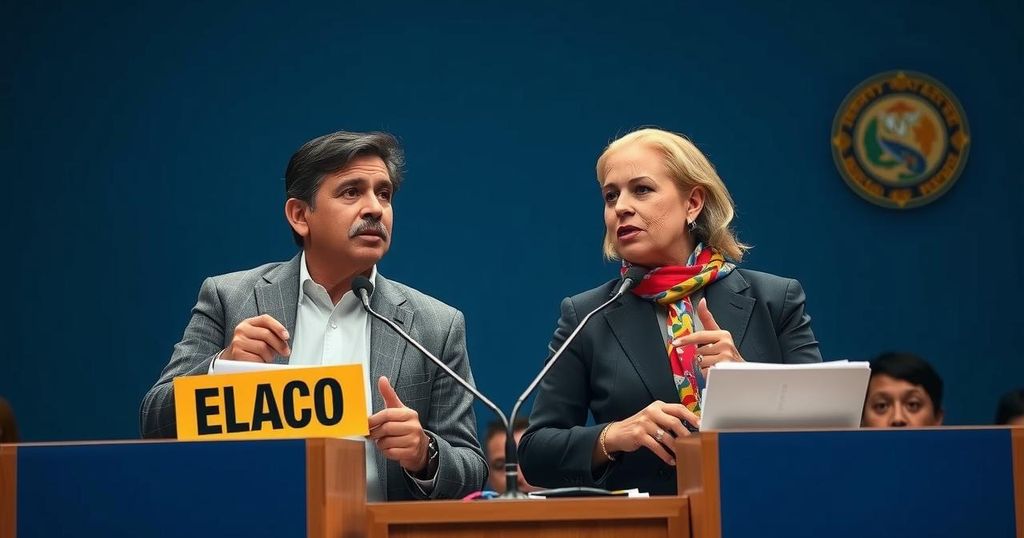Uruguay held a presidential election featuring two moderate candidates, Álvaro Delgado and Yamandú Orsi, showcasing political stability amid rising social issues. The election also included parliamentary votes and a referendum on social security reform. With high voter turnout and a lack of divisive rhetoric, the election reflects Uruguay’s commitment to democracy in a volatile regional landscape.
On Sunday, voters in Uruguay, a small yet politically stable nation in South America, cast their ballots for a new president amid a contest featuring two moderate candidates. This election carried significant importance, contrasting sharply with the heightened divisions and democratic challenges observed across much of the region. The electoral process saw participation from approximately 2.7 million eligible voters, who also engaged in parliamentary elections and a contentious referendum aimed at reforming the social security system. Local electoral officials reported a turnout exceeding 88 percent, a testament to Uruguay’s compulsory voting laws. Early results from the polls were anticipated shortly following their closure. The referendum regarding pension reforms, which threatens to increase the fiscal deficit in one of Latin America’s wealthiest countries, dominated media coverage ahead of the election, overshadowing other pressing issues such as child poverty, education, and public safety. Given the candidates’ similar stances on numerous issues, analysts predict minimal alterations in policy regardless of the election’s outcome. Uruguay, with a population of 3.4 million and a reputation as a model democracy, continues to epitomize political equilibrium. Political analyst Juan Cruz Díaz remarked, “In a way, Uruguay has been boring, but boring in this sense is very good.” While neighboring countries such as Brazil and Argentina grapple with political turmoil, Uruguayans largely express contentment with the administration’s pro-business approach and steady economic growth. Current President Luis Lacalle Pou maintains an approval rating of 50%, bolstered by his decision not to seek a second consecutive term due to constitutional limits. The ruling coalition’s candidate, Álvaro Delgado, formerly Lacalle Pou’s chief of staff, campaigns under the tenets of stability and continuity. In contrast, his opponent, Yamandú Orsi of the center-left Frente Amplio coalition, advocates for social progress, drawing on his experience as a former mayor. Polling data indicates Orsi leads with 44%, not enough to secure an outright victory and potentially leading to a runoff. The election day atmosphere in Montevideo was vibrant, highlighted by gatherings along the Rambla where supporters celebrated their democratic engagement. Orsi articulated the value of democracy, saying, “Uruguay has had the happiness for 40 uninterrupted years … the happiness that our citizens can elect their leaders.” Orsi’s campaign has garnered the support of former President José Mujica, an influential figure in Uruguay’s political landscape, now aged 89 and battling cancer. Shortly before the election, Mujica affirmed the necessity of supporting democracy, stating, “We need to support democracy, not because it is perfect, but because humans have not yet invented anything better.” Casting a distant third is Andrés Ojeda, who attracts younger voters with his unorthodox campaigning style, asserting, “The new politics is here to stay.” Voter concerns prominently feature rising crime rates, with differing approaches proposed by the ruling and opposition coalitions. Additionally, the issue of child poverty remains pressing, with one in five Uruguayan children living in such conditions, and a low high school graduation rate prevalent in political discourse. The more contentious aspect of this election is the proposed constitutional amendment on social security reform, opposed by both leading candidates. If approved, this initiative could substantially alter Uruguay’s economic landscape by shifting privately managed retirement savings to a government-run trust. In conclusion, Uruguay’s election showcases a notable pattern of moderation amidst a backdrop of regional divisiveness, characterized by respectful campaigning and a focus on critical social and economic issues.
Uruguay has a distinct political atmosphere characterized by stability and moderate leadership, setting it apart from other Latin American countries that have experienced significant political strife. With compulsory voting laws ensuring high turnout, elections in Uruguay have historically reflected a commitment to democratic principles. This specific election features two moderate candidates, Álvaro Delgado from a conservative coalition and Yamandú Orsi from the center-left Frente Amplio, both of whom largely agree on pertinent national issues, such as social security reform and economic management. The country’s political landscape is also influenced by key figures like former President José Mujica, known for his progressive governance. Currently, the electorate is concerned with rising crime rates, child poverty rates, and a challenging economic environment, particularly in relation to the proposed social security reforms that could reshape the financial landscape.
The recent election in Uruguay highlights the country’s ongoing commitment to political stability and democratic values. As voters chose between moderate candidates, the absence of divisive rhetoric stands in stark contrast to the political climates of neighboring nations. The electoral outcome will likely maintain the status quo in government policy while addressing critical social issues such as insecurity and poverty. Furthermore, the upcoming decision on social security reform represents a significant choice for the electorate that may redefine the social safety net for future generations.
Original Source: www.pbs.org






